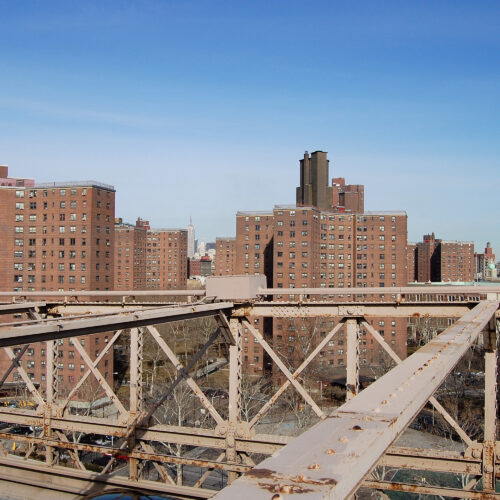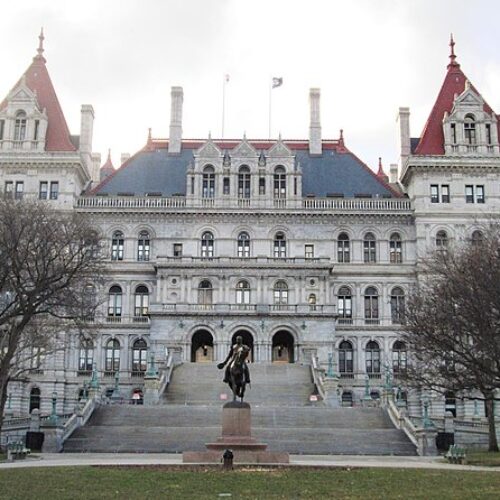New York
The state of New York delegates to its local governments the responsibility for funding and administering indigent defense services in adult criminal trials, though the state reimburses a portion of the costs through a standards-based program. A state commission provides limited oversight of local indigent defense.
The state of New York delegates to its local governments the responsibility for administering and funding indigent defense services for adult criminal cases in its appellate courts, though the state reimburses a portion of the costs through a standards-based reimbursement program. A state commission provides limited oversight of local appellate services.
-
62 Counties Primarily Locally Funded
-
62 Counties Locally Administered
-
62 Counties with a Commission With Limited Authority
-
62 Counties Primarily Locally Funded
-
62 Counties Locally Administered
-
62 Counties with a Commission With Limited Authority
Counties in New York are responsible for funding and administering indigent defense services. Counties provide representation through public defender offices, conflict defender offices, contracts with nonprofit organizations, panels of private attorneys paid on an hourly basis, or a combination. In counties with a public defender office, the county’s board of supervisors or legislature must appoint the chief public defender. Counties that administer panels of private attorneys must receive approval of their delivery plan by the state. The city of New York, which encompasses five counties, is responsible for determining how services are provided within its limits.
The Office of Indigent Legal Services (ILS) provides limited oversight through monitoring, studying, and making efforts to improve local indigent defense systems. A director leads ILS, and a nine-member board oversees the office. The governor appoints most of the board’s nine members from diverse groups’ recommendations. The board nominates the ILS director, and the governor ratifies the nomination. ILS can set standards for the local delivery of indigent defense services and enforce the standards through grant funding. ILS’s enforcement authority is limited to withholding state funds. While localities may receive state funds, the localities remain the primary funder of indigent defense.
Counties in New York are responsible for funding and administering indigent defense services in adult criminal appeals. Counties provide representation through public defender offices, conflict defender offices, contracts with nonprofit organizations, panels of private attorneys paid on an hourly basis, or a combination. In counties with a public defender office, the county’s board of supervisors or legislature must appoint the chief public defender. Counties that administer panels of private attorneys must receive approval of their delivery plan by the state. The city of New York, which encompasses five counties, is responsible for determining how services are provided within its limits.
The Office of Indigent Legal Services (ILS) provides limited oversight through monitoring, studying, and making efforts to improve local indigent defense systems. A director leads ILS, and a nine-member board oversees the office. The governor appoints most of the board’s nine members from diverse groups’ recommendations. The board nominates the ILS director, and the governor ratifies the nomination. ILS can set standards for the local delivery of indigent defense services and enforce the standards through grant funding. ILS’s enforcement authority is limited to withholding state funds. Localities may receive state funds but remain the primary funder of indigent defense.

Dig Deeper
Who serves on the Board of the Office of the Indigent Legal Services?
What rules must counties follow when establishing a public defender office or private attorney system?
How is the director of the Office of Indigent Legal Services selected?
How does the Office of Indigent Legal Services disseminate funding to local governments?
How is indigent defense structured in New York City?
In which branch of state government does the indigent defense system reside?
What is the Office of Indigent Legal Services' Statewide Appellate Support Center?
What is the Appellate Defender Council?
How are appellate indigent defense services provided in New York City?
Support Our Work
Criminal justice issues that disproportionately harm poor people, such as wrongful convictions and over-incarceration, cannot be fixed if indigent defendants are given attorneys who do not have the time, resources, or qualifications, to be a constitutional check on government. Yet, investment in improving indigent defense services remains largely neglected. The Sixth Amendment Center is the only nonprofit organization in the country that exclusively examines, uncovers, and helps fix the root of the indigent defense crisis in which inequality is perpetuated because poor defendants do not get a fair fight.
The Sixth Amendment Center is a tax-exempt 501(c)(3) nonprofit organization under EIN: 45-3477185.
Donations are tax-deductible to the fullest extent allowable under the law.






